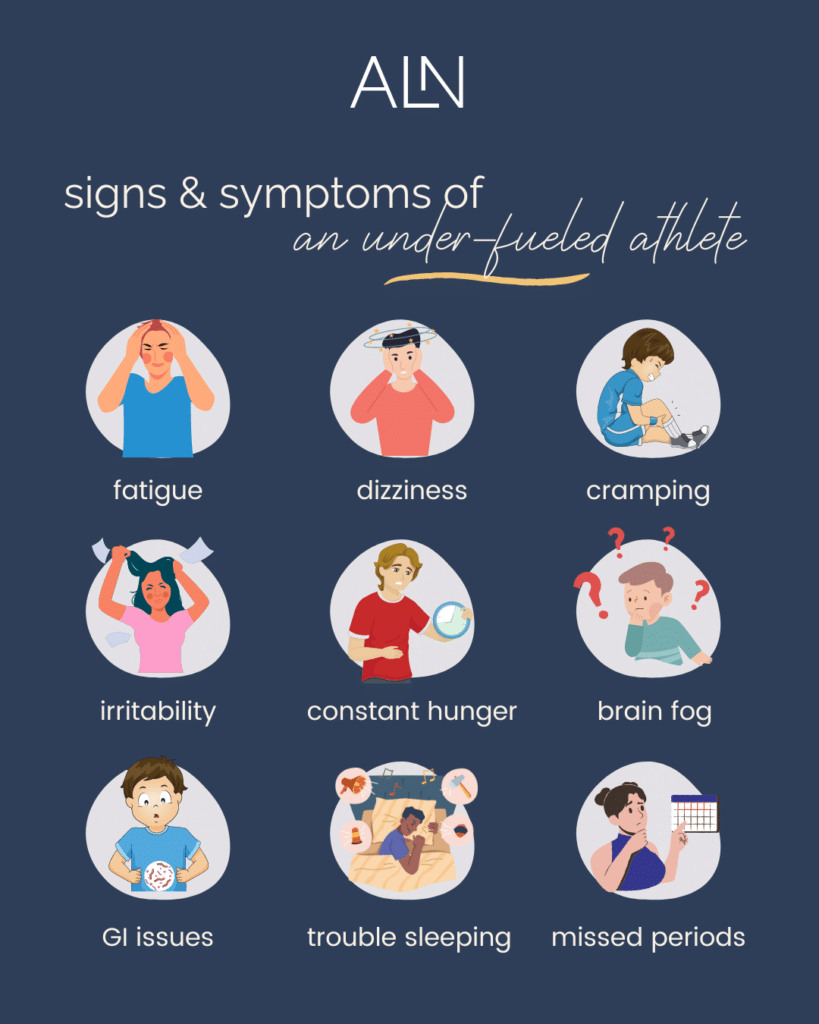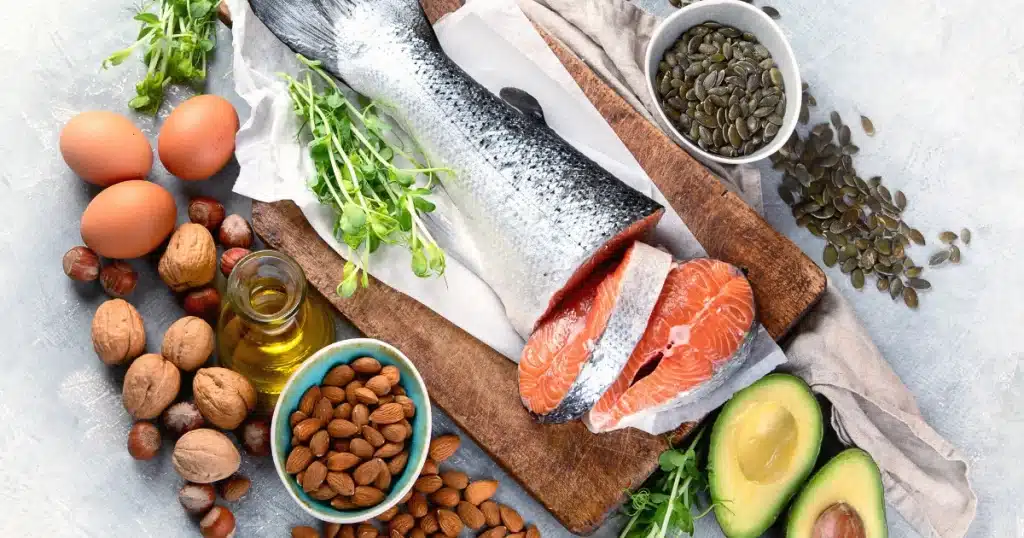RUNNING →
Level Up Your Nutrition Game With Our Freebies
Alex
I provide nutrition coaching for endurance athletes to improve performance and body composition through a simple and flexible eating style.
Hi, I'm
ATHLETE EATING GUIDE →
PROTEIN →
TRIATHLON →
RECIPES →
PERFORMANCE NUTRITION →
SUPPLEMENTS →
HOLIDAY & TRAVEL →
PLANT-BASED →
FEMALE ATHLETE NUTRITION
Explore the Blog
LEARN MORE →
ATHLETE GROCERY SHOPPING GUIDE →
RACE DAY: TRIATHLON NUTRITION PLANNER →
READY TO FUEL?
incredible value!
The fueling guide bundle serves as your one-stop-shop for strategies to fueling before, during and after your workouts.
ENDURANCE EATS
BINGE-WATCH READY!
YOUTUBE SERIES
Just like a car needs the right type of gas to run properly and efficiently. Runners need the right type of food to fuel the challenging demands of marathon training. Which is why I’m going to “run through” what to eat when training for a marathon!
So often we’re bombarded with nutrition and diet trends touting instant results, increased energy levels, and improvements in performance. With this we fail to identify the basics of what foods, and how much, we should really be eating. Furthermore, the demands of marathon training add in a significant factor in our eating behaviors.
Let’s disregard the diet trends and learn the best way to eat when training for a marathon. If you want your engine well-fueled throughout the entirety of your marathon training cycle, read on…

How much to eat when training for a marathon?
If you want your car to run, it needs gasoline — plain and simple. Similarly for runners, if you want to run, you need enough fuel.
It is important to understand that eating enough nutrition to fuel your workouts is just as important. If not more important than hyper focusing on every single food item that you consume.
Under-fueling when training for a marathon
Under-fueling can lead to inadequate nutrient intake. And this can lead to poor energy levels throughout the day, chronic fatigue, and a decrease in performance in workouts and in racing. Common signs and symptoms of under-fueling can range from…
- constant hunger,
- fatigue and irritability,
- trouble sleeping,
- hunger pangs while running,
- gastrointestinal distress and
- muscle cramps or weakness
Research shows that more long-term issues of under-fueling include injuries due to fatigue, loss of lean tissue, and disordered eating behaviors. Many runners may be unintentionally guilty of under-fueling. This may be due to lack of planning and preparing ahead at meal and snack times and therefore, may be skipping meals and snacks. Even striving to eat “healthy” can typically coincides with eating too few calories to meet training demands.

Over-fueling when training for a marathon
Over-fueling or getting in too much fuel than your body needs is often a concern I see in athletes. This can coincide with undesired weight gain during your training cycle, sluggishness, gastrointestinal issues such as bloating. It also can be linked to eating primarily foods that are high calorie and low nutrients (empty calories), such as an excessive amount of sugar-laden treats, soda and alcohol. While having those items in moderation is perfectly fine. Avoid consuming those things as a reward mechanism for marathon training.
To better identify just how much to eat while marathon training, listen to your body’s natural hunger and fullness cues. As a point of reference, most runners benefit from eating every 3-4 hours and including foods from all food groups to ensure calorie and nutrition needs are being met.
It is also important to recognize that there are certain factors such as acute or chronic stress, digestive issues, heat training, among others that may decrease your appetite. This is where intuitive eating tactics needs to change to intentional eating. Recognizing that while you may not have much of an appetite, but still making an effort to fuel your body. This will support effective recovery from the demands of training.
It’s recommended for most runners to aim for three meals per day including breakfast, lunch and an evening meal and 1-3 snacks. This would include a post-run snack on training days.
Foods to eat when training for a marathon
Popular fad diets are not ideal for nutrition performance. Focus on taking a balanced and sustainable approach to your nutrition without cutting out any major food groups.
Ideally when planning your meals and snacks to fuel your training, you want to include the right foods so that you make it to race start. Let’s walk through key features of those food choices.
Carbohydrates
Carbohydrates are premium fuel when it comes to filling your nutrition tank because carbohydrates are the most efficient source of energy.
When you consume carbohydrates, your body breaks it down into glucose (sugar). Glucose will be used for exercise or converted into muscle glycogen to be stored and used later. Typically, most runners require at least 55% of their calorie intake from carbohydrates. But, this can vary based on factors such as duration and intensity of run and carbohydrate-loading for an upcoming race. It is important to recognize that not all carbohydrates are the same. During marathon training, you will be consuming both simple and complex carbohydrates for fuel.

Simple carbohydrates:
Simple carbs are easy-to-digest and are found in raw sugar, energy gels, energy or sports drinks, fruit and fruit juices, soda, candy, and foods with added sugars such as cookies and desserts. Foods that are high in simple carbohydrate content are low in dietary fiber and break down quickly to be used as energy. These foods are effective while training to provide quick bursts of energy.
During your training runs, take in enough simple carbohydrates to avoid running out of fuel in the tank (aka: “hitting a wall”). Typically 60-90g of simple, easy-to-digest carbohydrates per hour, depending on the length of workout, is the target range for most runners. It is incredible key to experiment with fuel sources, such as energy gels, while training. This is to ensure that you will tolerate and minimize any risk of stomach cramps and upset on race day.
Complex carbohydrates:
Complex carbs take longer to digest. They’re found in higher-fiber, nutrient-dense foods. Such as, whole grains (barley, brown rice, quinoa, oats), legumes including beans and lentils, starchy vegetables such as sweet potatoes, potatoes, pumpkin, among others. These foods are excellent to include throughout the day in meals and snacks to boost your vitamin and mineral intake and help keep you feeling satisfied.
Protein
Research supports that adequate protein in endurance athletes, including marathoners, speeds up muscle recovery and offsets muscle damage.
Most endurance athletes will benefit from 1.2-2.0g of protein per kilogram of body weight, which should be spaced throughout the day. Lean protein-rich food sources to include on a regular basis include: poultry, fish, beef, pork, eggs, dairy including Greek yogurt and cottage cheese, tofu, tempeh, seitan, edamame, beans and lentils, and protein powder supplements. Most athletes fall short of their protein targets on a regular basis, but meeting those needs doesn’t need to be overcomplicated. If you are constantly falling short of meeting your protein needs, consider topping your toast with an egg (or two), adding a scoop of low-fat cottage cheese or Greek yogurt with your fruit smoothie, or make your own trail mix with dried edamame, pumpkin seeds, and pretzels.
Healthy Fats
Adequate dietary fat intake is important for giving your body enough fuel for training, helps with vitamin absorption, and decreases inflammation.
About ~20-30% of your diet should include healthy fat sources such as olive oil, nuts and seeds, olives and avocado. Flaxseed, chia seed and walnuts are extremely rich sources of omega-3 fatty acids. Research shows that regular consumption of omega-3s can help reduce inflammation from training demands.

Fruits and vegetables
Ideally the more, the better. Aiming for at least five servings of fruits and vegetables per day is ideal. Highly recommend focusing on a variety of produce to get a variety of vitamins and minerals.
Fresh doesn’t always need to be the focus. Stocking your pantry and freezer with canned and frozen options can be an easy, convenient, time-saving method. Here are some great strategies to sneak in produce:
- Topping your Greek yogurt with berries
- Adding sautéed spinach and peppers to your morning eggs
- Enjoying a mid-day fruit and spinach smoothie
- Sliced apples drizzled with almond butter
Fruits and vegetables are extremely rich in dietary fiber so if you are prone to gastrointestinal issues during your runs, choosing well-cooked lower-fiber vegetables and fruits may be a strategy to help lessen the unwanted side effects.
No need to diet when training for a marathon
Your diet does not need to be over-restrictive now that you are marathon training. Include some fun and truly enjoy it!
Eating for enjoyment can come in the form of flexibility. This could be having dessert a couple of times per week, a serving of alcohol on occasion, or dinner out with friends. Your marathon nutrition plan should never be overly-restrictive or cut out the foods that truly bring your enjoyment.
Nutrition plan for marathon training
Ideally it helps to work with a sports dietitian so you can better understand what your individualized nutrition plan is.
There is no one-size-fits-all approach to nutrition recommendations for marathon training. Every person is truly unique in their personal nutrition needs based on a wide variety of factors. While putting the pieces to the nutrition puzzle may seem overwhelming, it doesn’t have to be.
If you are struggling to put the pieces of the puzzle together, reach out and we can ensure you are well-fueled and having fun throughout the entirety of your marathon training cycle. If you are in an off-season, it’s an excellent time to optimize your day-to-day nutrition habits and fueling strategies heading into your next training cycle.
For individualized guidance and support on fueling your training and ultimately your race, reach out and let’s talk about 1:1 nutrition coaching. We provide personalized accountability and strive to teach you how to create a sustainable and flexible eating style to meet your needs as a runner.
Alex
I provide nutrition coaching for endurance athletes to improve performance and body composition through a simple and flexible eating style.
Hi, I'm
LEARN MORE →
take the quiz!
Let's discover your Endurance Nutrition IQ
How well do you know your fueling? Answer these questions and let's see where your endurance nutrition knowledge is at!
Take the quiz
level up your nutrition game with these freebies
free downloadS
Protein-Packed 10-Day Sample Meal Plan
Athlete Eating Guide
Athlete Grocery Shopping Guide
1
2
3
Inspiration to fit 120 grams of protein into your day
Planning what goes on your plate
Putting the right foods in your grocery cart
